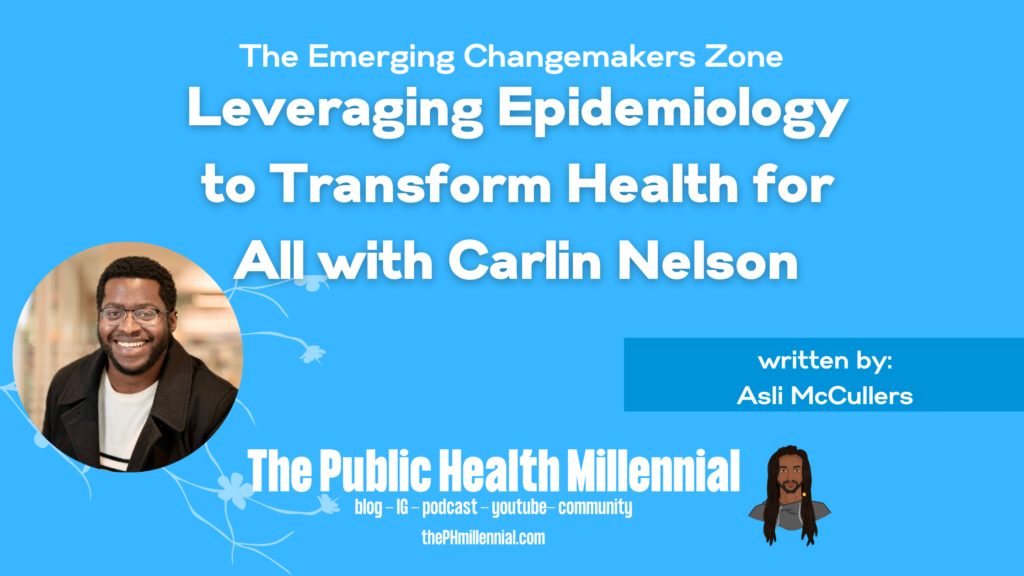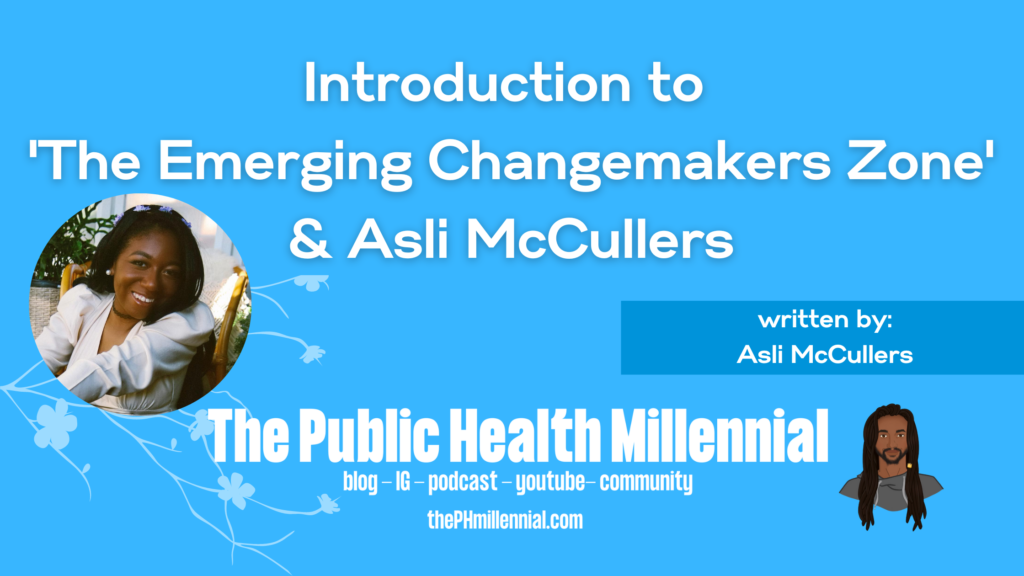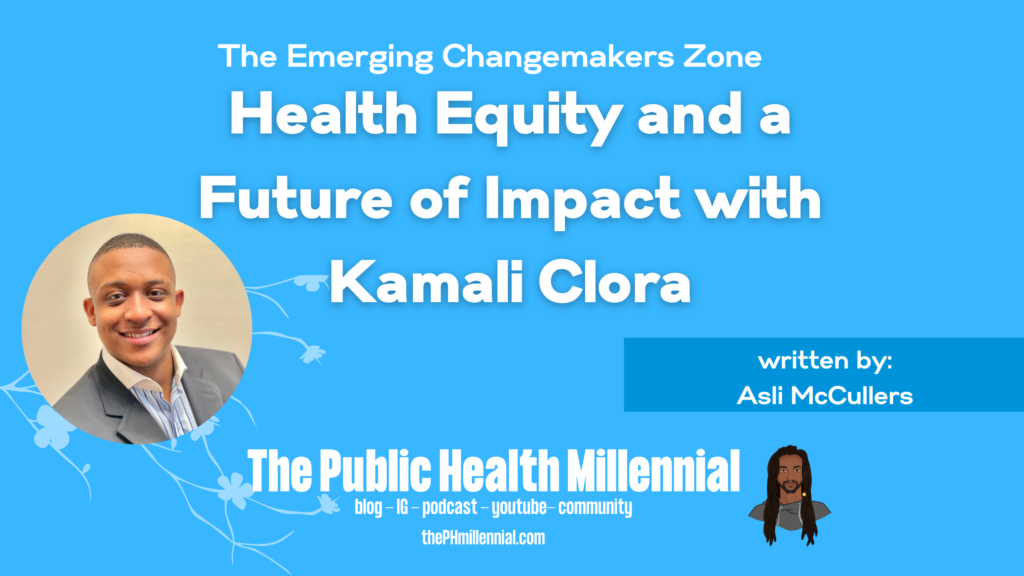Living the Why: How Carlin’s Lived Experiences Led Him To Health Equity
Like many of us emerging leaders, Carlin did not enter undergrad knowing much about public health, having originally explored Chemistry and Sociology as areas of study. It wasn’t until a friend encouraged him to try out a public health course that he realized how affected his own life was by health-related challenges. He shared;
“…we started talking about the social determinants of health. The more we talked about it, and the more we tied those factors to influence health outcomes, the more I realized that those conversations were talking about me and my experiences. I’m a first generation student..at the time I lived maybe 300% under the poverty line. So I got to notice how my behaviors and my health outcomes differed from more affluent family members or classmates. So, that’s kind of how I got into public health. And then, I love math and science, so Epidemiology just seemed like the way to go. To me it was like putting puzzle pieces together to figure out this big thing… I fell in love with coding and I kind of ran with it.”
Carlin expanded on his positionality as a Black man walking in this work, stating that intersectionality mirrors social determinants of health, and is an important catalyst to his passion. “I believe in intersectionality…” he says, “…I think that’s what kind of motivates me in public health…because I am African American, because I’m a first generation student who lived in a low socioeconomic status… I see what people have been through–I went through some of those things. I think that intrinsically motivates me to continue to work in public health, to help people that are still left behind, and to encourage the next generation of public health professionals”
Not only is Carlin the first person featured on this blog who has outright said he loves coding (lol), he’s also the first person that I’ve interviewed that has already completed not one but TWO terminal degrees–how amazing!!!
I also wanted to know more about his decision to pursue his PhD at a “for-profit” institution like Walden rather than a “traditional” research institution. My mother received her doctorate degree from University of Phoenix, so I was interested to hear another testimony on the experience of making the most of such a unique program! As Carlin goes on to share, sometimes it’s the best decision for people with already in-motion careers, families and other obligations. He gave the following insights for anyone considering a for-profit graduate degree;
“I think a lot of my classmates, both undergrad and grad, were shocked that I chose that route. But what I will say is when it comes to that situation, you kind of have to do what’s best for you. I think that in most schools, what you put in is what you get out. I realized going to Walden University that people may have thought it was unorthodox. So, I took every opportunity I could to make myself stand out amongst that cohort. While I went to Walden, I became a certified health education specialist. I got certified in public health. I did fellowships at the Central Intelligence Agency and at Nemours Hospital, and I did all these at the same time. So, gathering and strengthening my toolkit made me stand out against people who went the more traditional route.”
You heard it here, friends! There is so much more to consider than “name recognition” of a school–you can really get the most out of any institution, it’s all about choosing a place where you will thrive and have the ability to pour into gaining experience! I talk more about this in an interview I did for PHM a few months back!
Staying Grounded in Health Equity: Epidemiology Moves and Advice for Those Up and Coming
Carlin’s career to date has taken him to a dynamic array of places, including Clinical Trials at Johns Hopkins Medicine, Research at Truth Initiative, and Teaching Adjunct at Charleston Southern University. I also wanted to know more about how he’s able to meaningfully incorporate health equity in his day-to-to with Epi being so data focused—sometimes, getting that community health energy can be tough when you’re on that analytical side. Here’s how he weighed in;
“…I think for me, as an epidemiologist, I see that there’s a disconnect between assessment and policy development. So we’re getting all this data, we’re answering all these research questions, but somehow it’s not being tailored into policy. And because policy makes how society works, there’s a critical gap there. So, it can be kind of frustrating to say, ‘Hey, we have this data, the data are what the data are, this is what’s going on, this is what’s happening with the people.’…it’s having those tough conversations with legislators and saying, ‘Hey, this is what needs to be done. This is what we’ve proven’, and that can be kind of difficult.”
Outside of work, mentorship and teaching was one of Carlin’s greatest joys in moving health equity forward, as he reflected fondly on his times as an adjunct professor. “Some of my students were wild lol…but they made the job worth it!”
On the note of mentorship, I was super excited to hear more on what Carlin’s biggest pieces of advice were for emerging leaders interested in building a career in health equity. Check it out!
- Grow Your Network: “Networking is very important…in the famous words of Issa Rae, people have a tendency to want to ‘network up’ instead of ‘networking across’. Working with people who are in the trenches or in the field with you who are on the same level with you is important, because of the simple fact that you don’t know who knows who.”
- Take Opportunities: “There are tons of opportunities for grad students and even undergraduate students to focus on research with that health equity lens” Carlin says. He specifically recommends checking out programs with the National Institutes of Health, including their STEP-UP program that he participated in back in the day!
- Staying Humble: One of my questions for Carlin was how he ensures that the distance never grows too large between him and his community as he gains more and more degrees and prestigious accomplishments as “Dr. Nelson”. He shared the following sweet sentiment “I try not to let it create a distance. So, in both familiar and unfamiliar spaces, when it comes to my community, I simply say, ‘it’s Carlin, you can just call me Carlin’. I share my story just to let them know that I’m really not that different from them. Yeah, I went to school, but I’m from the same area. I’ve done some of the same things… at the end of the day, we’re the same person”
I always love to close out by inviting guests to share what they hope their greatest accomplishment will be looking back many years from now. Carlin shared that his ultimate goal when it comes to health equity is creating data-driven, targeted, and sustainable interventions for people of color by investigating the nexus between environmental health, social determinants of health, and health outcomes.
“I think in the perfect world, for me to feel as if I’ve truly made a contribution to public health and health equity, would have to be the, contributing to the reduction and elimination of health disparities, because they’re preventable and because they’re structurally placed to impact people of color. I think that if I’m able to change the system or if I’m able to bridge the gap between those three core functions of public health…It may not happen in my lifetime, but the future generations shouldn’t deal with what us millennials are dealing with. And so if I can somehow, through epidemiology, through biostatistics promote health equity through investigating health outcomes, I think that would probably be like my “A-ha” moment. I could probably retire in peace.”
Thank you sooo much to Carlin for sharing his health equity journey! I’m already so inspired by him, and am so excited for what his future holds! 😊
Connect with Carlin on Linkedin, and share this with a student interested in health equity work!



